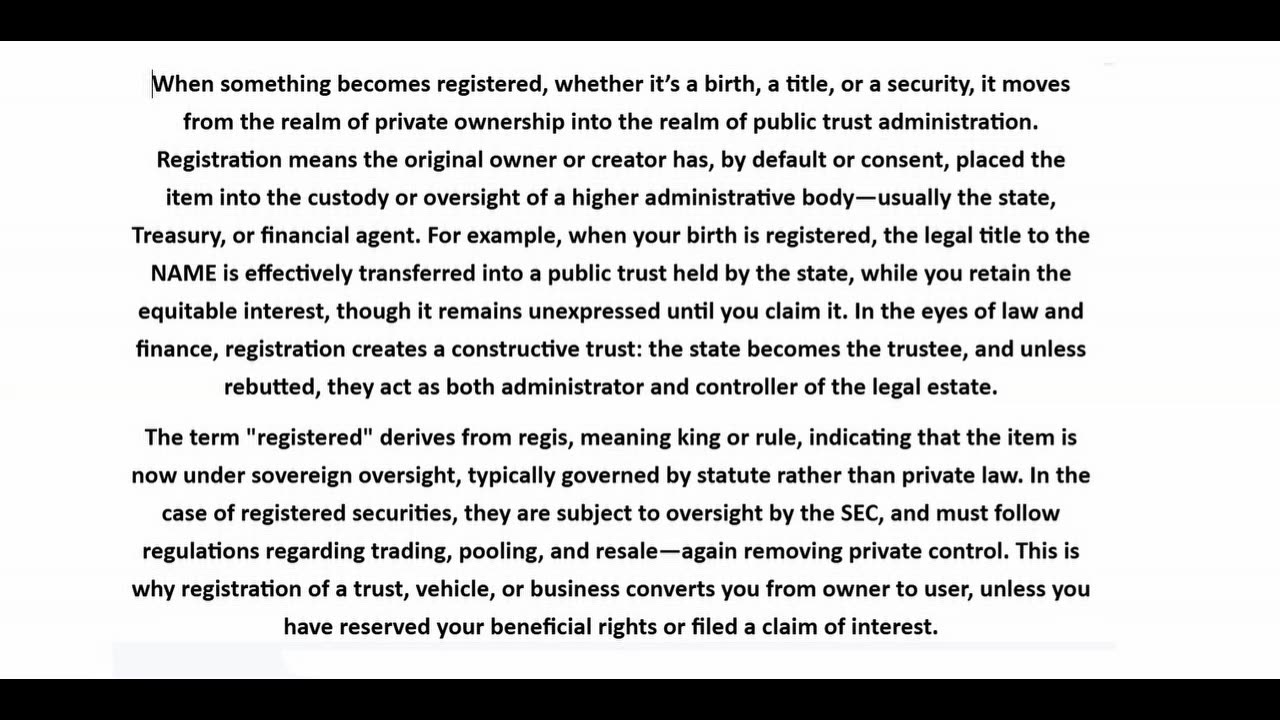Premium Only Content

When something becomes registered, whether it’s a birth, a title, or a security,
When something becomes registered, whether it’s a birth, a title, or a security, it moves from the realm of private ownership into the realm of public trust administration. Registration means the original owner or creator has, by default or consent, placed the item into the custody or oversight of a higher administrative body—usually the state, Treasury, or financial agent. For example, when your birth is registered, the legal title to the NAME is effectively transferred into a public trust held by the state, while you retain the equitable interest, though it remains unexpressed until you claim it. In the eyes of law and finance, registration creates a constructive trust: the state becomes the trustee, and unless rebutted, they act as both administrator and controller of the legal estate.
The term "registered" derives from regis, meaning king or rule, indicating that the item is now under sovereign oversight, typically governed by statute rather than private law. In the case of registered securities, they are subject to oversight by the SEC, and must follow regulations regarding trading, pooling, and resale—again removing private control. This is why registration of a trust, vehicle, or business converts you from owner to user, unless you have reserved your beneficial rights or filed a claim of interest.
-
 1:03:49
1:03:49
We The People - Constitutional Conventions
3 days agoClaim your name for peace and protection
373 -
 1:53:59
1:53:59
The Quartering
3 hours agoToday's Breaking News!
72.1K9 -
 5:38
5:38
Dr. Nick Zyrowski
10 days agoHow To Do a VITAMIN C Flush - Untold Truth!
33.5K2 -
 8:21
8:21
MattMorseTV
3 hours ago $2.14 earnedTrump just SCORED a $500,000,000 LEGAL WIN.
31K14 -
 1:00:00
1:00:00
The White House
8 hours agoVice President JD Vance Delivers Remarks at ALTA Refrigeration Inc
27.1K21 -
 3:14:28
3:14:28
Barry Cunningham
5 hours agoBREAKING NEWS: PRESIDENT TRUMP HAS THE LETITIA JAMES FINE THROWN OUT BY APPELLATE COURT! WINNING!
34K18 -
 2:11:05
2:11:05
Side Scrollers Podcast
7 hours agoDISASTROUS Cracker Barrel Rebrand + Destiny PDF Allegations + More | Side Scrollers Live
50.7K19 -
 1:45:51
1:45:51
Reidboyy
4 hours ago $1.95 earnedNEW FREE FPS OUT ON CONSOLE NOW! (Delta Force = BF6 with Killstreaks)
35.7K1 -
 4:40:16
4:40:16
GloryJean
7 hours agoAggressive Solos on MnK 🖱️ 6.7 K/D
42.3K -
 15:38
15:38
Russell Brand
1 day agoThis Is The Reason We'll Never Forget
80.3K210